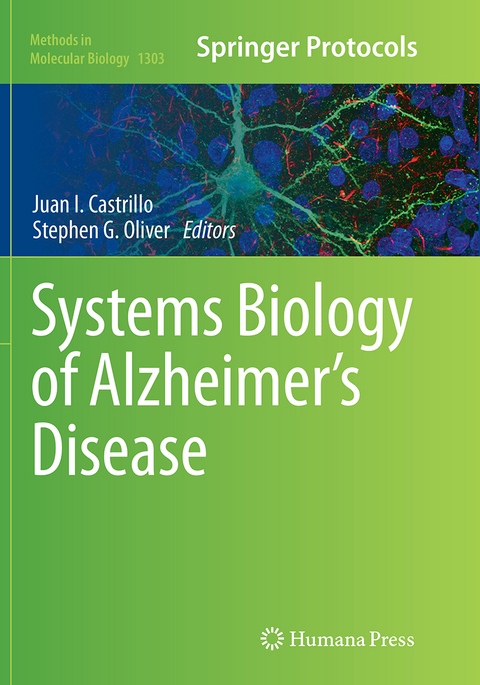
Systems Biology of Alzheimer's Disease
Humana Press Inc. (Verlag)
978-1-4939-4703-4 (ISBN)
This book addresses such an integrated approach to AD. It aims to present Systems Biology, including both experimental and computational approaches, as a new strategy for the study of AD and other multifactorial diseases, with the hope that the results will translate into more effective diagnosis and treatment, as well as improved public health policies.
Written for the highly successful Methods in Molecular Biology series, practical and cutting-edge, Systems Biology of Alzheimer’s Disease is intended for post-graduate students, post-doctoral researchers and experts in different fields with an interest in comprehensive Systems Biology strategies applicable to AD and other complex multifactorial diseases (including other neurodegenerative diseases and cancers). This book aims to complement other excellent volumes and monographs on AD that cover fundamental, physiological or medical aspects of the disease.
Stephen G. Oliver Department of Biochemistry & Cambridge Systems Biology Centre University of Cambridge Cambridge UK steve.oliver@bioc.cam.ac.uk Juan I. Castrillo Department of Biochemistry & Cambridge Systems Biology Centre University of Cambridge Cambridge UK Genetadi Biotech S.L. Praque Tecnologico de Bizkaia Derio, Bizkaia, Spain jicd28@yahoo.co.uk jic28@genetadi.com
Alzheimer’s as a Systems-Level Disease Involving the Interplay of Multiple Cellular Networks.- Application of Systems Theory in Longitudinal Studies on the Origin and Progression of Alzheimer’s Disease.- The APP Proteolytic System and Its Interactions with Dynamic Networks in Alzheimer’s Disease.- Effects of Mild and Severe Oxidative Stress on BACE1 Expression and APP Amyloidogenic Processing.- Advanced Assay Monitoring APP-Carboxyl-Terminal Fragments as Markers of APP Processing in Alzheimer Disease Mouse Models.- Advanced Optical Super-Resolution Method and Techniques for the Study of β-Amyloid Aggregation In Vitro and In Vivo.- Protocols for Monitoring the Development of Tau Pathology in Alzheimer’s Disease.- LC3-II Tagging and Western Blotting for Monitoring Autophagic Activity in Mammalian Cells.- Advanced Mitochondrial Respiration Assay for Evaluation of Mitochondrial Dysfunction in Alzheimer’s Disease.- Analysis of Microglial Proliferation in Alzheimer’s Disease.- Yeast as aModel for Alzheimer’s Disease: Latest Studies and Advanced Strategies.- Yeast as a Model for Studies on Aβ Aggregation Toxicity in Alzheimer’s Disease, Autophagic Responses, and Drug Screening.- Drosophila melanogaster as a Model for Studies on the Early Stages of Alzheimer’s Disease.- Chronic Mild Stress Assay Leading to Early Onset and Propagation of Alzheimer’s Disease Phenotype in Mouse Models.- Gene Expression Studies on Human Trisomy 21 iPSCs and Neurons: Towards Mechanisms Underlyi
ng Down’s Syndrome and Early Alzheimer’s Disease-Like Pathologies.- Cortical Differentiation of Human Pluripotent Cells for In Vitro Modeling of Alzheimer’s Disease.- Next Generation Sequencing in Alzheimer’s Disease.- Pooled-DNA Sequencing for Elucidating New Genomic Risk Factors, Rare Variants Underlying Alzheimer’s Disease.- New Genome-Wide Methods for Elucidation of Candidate Copy Number Variations (CNVs) Contributing to Alzheimer’s Disease Heritability.- RNA-Sequencing to Elucidate Early Patterns of Dysregulation Underlying the Onset of Alzheimer’s Disease.- Systems Biology Approaches to the Study of Biological Networks Underlying Alzheimer’s Disease: Role of miRNAs.- The Emerging Role of Metalloproteomics in Alzheimer’s Disease Research.- Redox Proteomics in Human Biofluids: Sample Preparation, Separation and Immunochemical Tagging for Analysis of Protein Oxidation.- Advanced Shotgun Lipidomics for Characterization of Altered Lipid Patterns in Neurodegenerative Diseases and Brain Injury.- AlzPathway, an Updated Map of Curated Signaling Pathways: Towards Deciphering Alzheimer’s Disease Pathogenesis.- A Computational Network Biology Approach to Uncover Novel Genes Related to Alzheimer’s Disease.- Network Approaches to the Understanding of Alzheimer’s Disease: From Model Organisms to Humans.- Characterization of Genetic Networks Associated with Alzheimer's Disease.- Network-Based Analysis for Uncovering Mechanisms Underlying Alzheimer’s Disease.- The SDREM Method for Reconstructing Signaling and Regulatory Response Networks: Applications for Studying Disease Progression.- Advanced Neuroimaging Methods Towards Characterization of Early Stages of Alzheimer’s Disease.- Plasma Proteomics Biomarkers in Alzheimer's Disease: Latest Advances and Challenges.- A Practical Guide For Exploring Opportunities of Repurposing Drugs for CNS Diseases in Systems Biology.
| Erscheinungsdatum | 11.11.2016 |
|---|---|
| Reihe/Serie | Methods in Molecular Biology ; 1303 |
| Zusatzinfo | 56 Illustrations, color; 18 Illustrations, black and white; XVI, 563 p. 74 illus., 56 illus. in color. |
| Verlagsort | Totowa, NJ |
| Sprache | englisch |
| Maße | 178 x 254 mm |
| Themenwelt | Medizin / Pharmazie ► Studium |
| Naturwissenschaften ► Biologie ► Humanbiologie | |
| Naturwissenschaften ► Biologie ► Zoologie | |
| Schlagworte | Alzheimer’s disease (AD) • computational systems biology • Disease models • Disease risk classification • Experimental systems biology • Impaired and homeostatic networks • Interactomes • network biology • Next generation post-genomic techniques • Omics • Personalized medicine • proteostasis • Stratification |
| ISBN-10 | 1-4939-4703-6 / 1493947036 |
| ISBN-13 | 978-1-4939-4703-4 / 9781493947034 |
| Zustand | Neuware |
| Haben Sie eine Frage zum Produkt? |
aus dem Bereich


